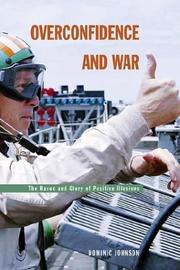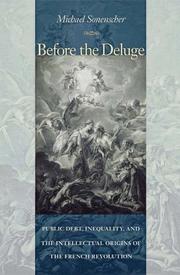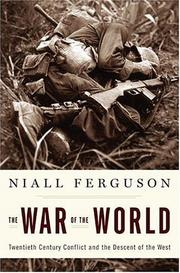| Listing 1 - 10 of 42 | << page >> |
Sort by
|
Book
ISBN: 9781907301018 1907301011 Year: 2010 Publisher: Colchester ECPR
Abstract | Keywords | Export | Availability | Bookmark
 Loading...
Loading...Choose an application
- Reference Manager
- EndNote
- RefWorks (Direct export to RefWorks)
Polemology --- War --- 855 Oorlogsvoering --- 856 Conflictbenadering --- Causes of war --- Causes
Book
ISBN: 9780521708234 9780521881791 9780511627224 Year: 2009 Volume: 110 Publisher: Cambridge Cambridge University Press
Abstract | Keywords | Export | Availability | Bookmark
 Loading...
Loading...Choose an application
- Reference Manager
- EndNote
- RefWorks (Direct export to RefWorks)
International relations. Foreign policy --- Polemology --- 850 Vrede- en conflictstudies --- 855 oorlogsvoering --- War --- Causes of war --- Causes

ISBN: 0674039165 9780674039162 9780674015760 0674015762 Year: 2004 Publisher: Cambridge, Mass. : Harvard University Press,
Abstract | Keywords | Export | Availability | Bookmark
 Loading...
Loading...Choose an application
- Reference Manager
- EndNote
- RefWorks (Direct export to RefWorks)
Opponents rarely go to war without thinking they can win--and clearly, one side must be wrong. This conundrum lies at the heart of the so-called "war puzzle": rational states should agree on their differences in power and thus not fight. But as Dominic Johnson argues in Overconfidence and War, states are no more rational than people, who are susceptible to exaggerated ideas of their own virtue, of their ability to control events, and of the future. By looking at this bias--called "positive illusions"--as it figures in evolutionary biology, psychology, and the politics of international conflict, this book offers compelling insights into why states wage war. Johnson traces the effects of positive illusions on four turning points in twentieth-century history: two that erupted into war (World War I and Vietnam); and two that did not (the Munich crisis and the Cuban missile crisis). Examining the two wars, he shows how positive illusions have filtered into politics, causing leaders to overestimate themselves and underestimate their adversaries--and to resort to violence to settle a conflict against unreasonable odds. In the Munich and Cuban missile crises, he shows how lessening positive illusions may allow leaders to pursue peaceful solutions. The human tendency toward overconfidence may have been favored by natural selection throughout our evolutionary history because of the advantages it conferred--heightening combat performance or improving one's ability to bluff an opponent. And yet, as this book suggests--and as the recent conflict in Iraq bears out--in the modern world the consequences of this evolutionary legacy are potentially deadly.
War --- Military history, Modern --- Causes of war --- Morale --- Psychological aspects. --- Causes.

ISBN: 9786612129780 1282259113 1282129783 9786612259111 1400827701 9781400827701 9781282129788 9780691124995 069112499X Year: 2009 Publisher: Princeton, NJ
Abstract | Keywords | Export | Availability | Bookmark
 Loading...
Loading...Choose an application
- Reference Manager
- EndNote
- RefWorks (Direct export to RefWorks)
Ever since the French Revolution, Madame de Pompadour's comment, "Après moi, le déluge" (after me, the deluge), has looked like a callous if accurate prophecy of the political cataclysms that began in 1789. But decades before the Bastille fell, French writers had used the phrase to describe a different kind of selfish recklessness--not toward the flood of revolution but, rather, toward the flood of public debt. In Before the Deluge, Michael Sonenscher examines these fears and the responses to them, and the result is nothing less than a new way of thinking about the intellectual origins of the French Revolution. In this nightmare vision of the future, many prerevolutionary observers predicted that the pressures generated by modern war finance would set off a chain of debt defaults that would either destroy established political orders or cause a sudden lurch into despotic rule. Nor was it clear that constitutional government could keep this possibility at bay. Constitutional government might make public credit more secure, but public credit might undermine constitutional government itself. Before the Deluge examines how this predicament gave rise to a widespread eighteenth-century interest in figuring out how to establish and maintain representative governments able to realize the promise of public credit while avoiding its peril. By doing so, the book throws new light on a neglected aspect of modern political thought and on the French Revolution.
HISTORY --- War --- HISTORY / Europe / France. --- Causes of war --- Annals --- Auxiliary sciences of history --- France --- History --- Causes.
Book
ISBN: 1474202276 1782259546 9781782259558 1782259554 9781474202275 1849466459 9781849466455 9781782259541 9781782259541 Year: 2016 Publisher: [Oxford] : Hart Publishing,
Abstract | Keywords | Export | Availability | Bookmark
 Loading...
Loading...Choose an application
- Reference Manager
- EndNote
- RefWorks (Direct export to RefWorks)
"This is the second volume of a projected five-volume series charting the causes of war from 3000 BCE to the present day, written by a leading international lawyer, and using as its principal materials the documentary history of international law, largely in the form of treaties and the negotiations which led up to them. These volumes seek to show why millions of people, over thousands of years, slew each other. In departing from the various theories put forward by historians, anthropologists and psychologists, Gillespie offers a different taxonomy of the causes of war, focusing on the broader settings of politics, religion, migrations and empire-building. These four contexts were dominant and often overlapping justifications during the first four thousand years of human civilisation, for which written records exist."--Bloomsbury Publishing.
War --- Causes of war --- Causes. --- Military history. --- Military historiography --- Military history --- Wars --- Historiography --- History --- Naval history
Book
ISBN: 1635900700 9781635900705 9781635900040 1635900042 Year: 2016 Publisher: South Pasadena, CA
Abstract | Keywords | Export | Availability | Bookmark
 Loading...
Loading...Choose an application
- Reference Manager
- EndNote
- RefWorks (Direct export to RefWorks)
"In Wars and Capital, Éric Alliez and Maurizio Lazzarato propose a counter-history of capitalism to recover the reality of the wars that are inflicted on us and denied to us. We experience not the ideal war of philosophers, but wars of class, race, sex, and gender; wars of civilization and the environment; wars of subjectivity that are raging within populations and that constitute the secret motor of liberal governmentality. By naming the enemy (refugees, migrants, Muslims), the new fascisms establish their hegemony on the processes of political subjectivation by reducing them to racist, sexist, and xenophobic slogans, fanning the flames of war among the poor and maintaining the total war philosophy of neoliberalism. Because war and fascism are the repressed elements of post-'68 thought, Alliez and Lazzarato not only read the history of capital through war but also read war itself through the strange revolution of '68, which made possible the passage from war in the singular to a plurality of wars--and from wars to the construction of new war machines against contemporary financialization. It is a question of pushing "'68 thought" beyond its own limits and redirecting it towards a new pragmatics of struggle linked to the continuous war of capital. It is especially important for us to prepare ourselves for the battles we will have to fight if we do not want to be always defeated." -- Back cover.
War --- Causes of war --- Economics of war --- Competition, International --- War, Cost of --- Economic aspects. --- Causes.
Book
ISBN: 1107204437 0511849214 1282818694 9786612818691 0511761481 0511917503 0511916523 0511918488 0511914717 0511912919 0521192838 0521170451 9780511918483 9780521170451 9780511761485 9780511914713 9780521192835 Year: 2010 Publisher: Cambridge New York Cambridge University Press
Abstract | Keywords | Export | Availability | Bookmark
 Loading...
Loading...Choose an application
- Reference Manager
- EndNote
- RefWorks (Direct export to RefWorks)
Four generic motives have historically led states to initiate war: fear, interest, standing, and revenge. Using an original data set, Richard Ned Lebow examines the distribution of wars across three and a half centuries and argues that, contrary to conventional wisdom, only a minority of these were motivated by security or material interest. Instead, the majority are the result of a quest for standing, and for revenge - an attempt to get even with states who had previously made successful territorial grabs. Lebow maintains that today none of these motives are effectively served by war - it is increasingly counterproductive - and that there is growing recognition of this political reality. His analysis allows for more fine-grained and persuasive forecasts about the future of war as well as highlighting areas of uncertainty.
War --- Causes of war --- Causes. --- Social Sciences --- Political Science --- International relations.
Book
ISBN: 0511699085 1107199794 1282393510 0511647468 9786612393518 051162722X 0511593724 0511651546 0511592795 0511595654 052188179X 0521708230 Year: 2009 Publisher: New York : Cambridge University Press,
Abstract | Keywords | Export | Availability | Bookmark
 Loading...
Loading...Choose an application
- Reference Manager
- EndNote
- RefWorks (Direct export to RefWorks)
John A. Vasquez's The War Puzzle provided one of the most important scientific analyses of the causes of war of the last two decades. The War Puzzle Revisited updates and extends his groundbreaking work, reviewing research on the onset and expansion of war and the conditions of peace. Vasquez describes systematically those factors associated with wars to see if there is a pattern that suggests why war occurs, and how it might be avoided, delineating the typical path by which relatively equal states have become embroiled in wars in the modern global system. The book uses the large number of empirical findings generated s the basis of its theorizing, and integrates these research findings so as to advance the scientific knowledge of war and peace.
War --- Causes of war --- Causes. --- Political violence. --- Violence --- Political crimes and offenses --- Terrorism --- Social Sciences --- Political Science

ISBN: 1594201005 9781594201004 Year: 2006 Publisher: New York (N.Y.) Penguin
Abstract | Keywords | Export | Availability | Bookmark
 Loading...
Loading...Choose an application
- Reference Manager
- EndNote
- RefWorks (Direct export to RefWorks)
War. --- War --- World politics --- Guerre --- Politique mondiale --- Causes. --- Causes --- Causes of war --- Armed conflict (War) --- Conflict, Armed (War) --- Fighting --- Hostilities --- Wars --- International relations --- Military art and science --- Peace
Book
ISBN: 9780754679370 0754679373 9780754698555 0754698556 1317162196 1317162188 1282614797 9786612614798 9781315573380 9781317162179 9781317162186 1315573385 9781317162193 9781282614796 661261479X Year: 2010 Publisher: Farnham, Surrey, England Burlington, VT Ashgate Pub.
Abstract | Keywords | Export | Availability | Bookmark
 Loading...
Loading...Choose an application
- Reference Manager
- EndNote
- RefWorks (Direct export to RefWorks)
This study introduces the concept of a conflict hot spot to the broader empirical literature on conflict processes. It identifies common causes and consequences of conflict hot spots across many regions globally, offering a theoretical and empirical contribution to the emerging literature on the spatiality of conflict processes.
HOT SPOTS (POLITICAL SCIENCE) --- WAR --- War. --- War --- Causes of war --- Armed conflict (War) --- Conflict, Armed (War) --- Fighting --- Hostilities --- Wars --- International relations --- Military art and science --- Causes.
| Listing 1 - 10 of 42 | << page >> |
Sort by
|

 Search
Search Feedback
Feedback About UniCat
About UniCat  Help
Help News
News